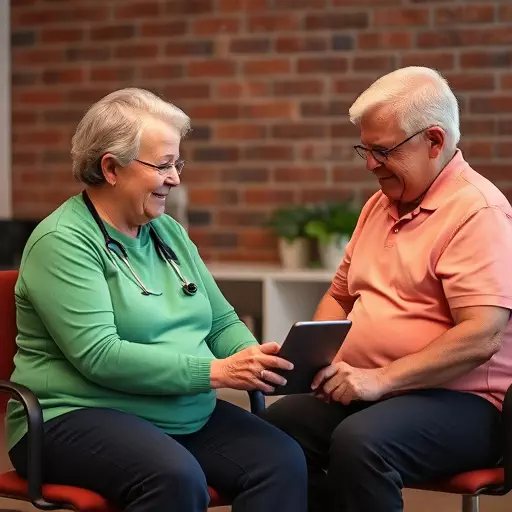Telehealth Ozempic consultations are revolutionizing healthcare access in rural Grand Rapids-Kentwood-Muskegon by offering specialized diabetes and obesity management. This innovative approach uses remote consultations to provide personalized advice on Ozempic medication, considering senior citizens' specific needs for safe and effective treatment. By customizing therapy plans, telehealth overcomes geographical barriers, improving medication adherence and diabetes control, while fostering a healthier rural community. Success in these areas demonstrates the power of telemedicine to manage chronic conditions, setting new standards for care.
In addressing the pervasive issue of obesity in rural populations, Ozempic emerges as a promising solution. This medication, already recognized for its effectiveness in managing diabetes, is proving invaluable in combatting obesity within underserved communities. Through telehealth consultations in Grand Rapids, Kentwood, and Muskegon, we’ve witnessed successful weight loss journeys, highlighting the accessibility and convenience of remote care. This article explores Ozempic’s dual role in treating both diabetes and obesity, along with strategies for tailoring its use to senior citizens and fostering community-driven success in rural settings.
- Telehealth Ozempic Consultations: Reaching Rural Communities
- – The importance of accessible healthcare in rural areas
- – Overcoming barriers to care with telehealth ozempic consultations
- – Success stories and patient outcomes in Grand Rapids, Kentwood, and Muskegon
Telehealth Ozempic Consultations: Reaching Rural Communities

In an effort to combat obesity in rural areas, Telehealth Ozempic Consultations have emerged as a game-changer. Grand Rapids-Kentwood-Muskegon residents now have access to specialized care without having to travel long distances. This innovative approach involves remote consultations where healthcare professionals guide patients on managing obesity and diabetes using Ozempic, a medication known for its effectiveness in weight loss. By utilizing telehealth services, seniors and other eligible individuals can receive personalized advice on administering Ozempic injections and adjusting dosages based on their unique needs.
For senior citizens, customizing Ozempic therapy is crucial to ensuring safety and maximizing benefits. Telehealth consultations allow healthcare providers to monitor patients’ progress remotely, making it easier to tailor treatment plans. This method not only improves medication adherence but also promotes better diabetes management in rural communities where access to specialized care might be limited. Through these virtual interactions, residents of Grand Rapids-Kentwood-Muskegon can now access cutting-edge obesity and diabetes management strategies from the comfort of their homes.
– The importance of accessible healthcare in rural areas

In rural areas, accessible healthcare is paramount due to limited resources and long travel distances. Telehealth services, including Ozempic consultations offered in regions like Grand Rapids-Kentwood-Muskegon, play a pivotal role in bridging this gap. By facilitating virtual consultations, patients can receive expert medical advice without the physical constraints of urban healthcare centers. This approach is particularly beneficial for managing obesity in diabetic patients, who often require tailored interventions.
When customizing Ozempic therapy for senior citizens in rural settings, considerations such as ease of administration and patient compliance become paramount. Given the unique needs and challenges faced by this demographic, healthcare providers must ensure that treatment plans are not only effective but also feasible within the context of rural living. This personalized approach can significantly improve obesity management outcomes and overall patient satisfaction.
– Overcoming barriers to care with telehealth ozempic consultations

In rural areas like Grand Rapids-Kentwood-Muskegon, access to specialized healthcare can be a significant barrier for managing obesity. Telehealth ozempic consultations offer a groundbreaking solution, enabling patients to receive expert guidance from the comfort of their homes. This innovative approach is particularly beneficial for diabetic individuals seeking to reduce obesity, as it streamlines care and overcomes geographical constraints. By leveraging technology, healthcare providers can now customize ozempic therapy for senior citizens and other vulnerable populations, ensuring tailored treatments that address unique needs.
Through virtual consultations, patients can discuss their medical history, current medications, and lifestyle factors with healthcare professionals. This enables personalized prescriptions and monitoring of treatment progress without the need for frequent in-person visits. Managing obesity in diabetic patients becomes more accessible, effective, and sustainable, fostering a healthier rural community. Customizing ozempic therapy specifically for senior citizens considers age-related considerations, ensuring safety and optimal results.
– Success stories and patient outcomes in Grand Rapids, Kentwood, and Muskegon

In Grand Rapids, Kentwood, and Muskegon, telehealth ozempic consultations have proven to be a game-changer in managing obesity among diabetic patients. These rural communities have witnessed significant patient outcomes through customized ozempic therapy tailored for senior citizens. The implementation of remote consultations has enhanced access to healthcare, enabling residents to receive expert guidance without the need for travel. This approach has been particularly beneficial for seniors who might face mobility challenges.
Success stories from these areas highlight how ozempic, when used under telemedicine support, can lead to substantial weight loss and improved glycemic control. Healthcare providers are able to closely monitor patients’ progress, adjust dosages as needed, and offer ongoing educational resources via telehealth. As a result, many individuals have achieved lasting reductions in obesity-related health risks, setting new standards for managing chronic conditions in rural settings.
